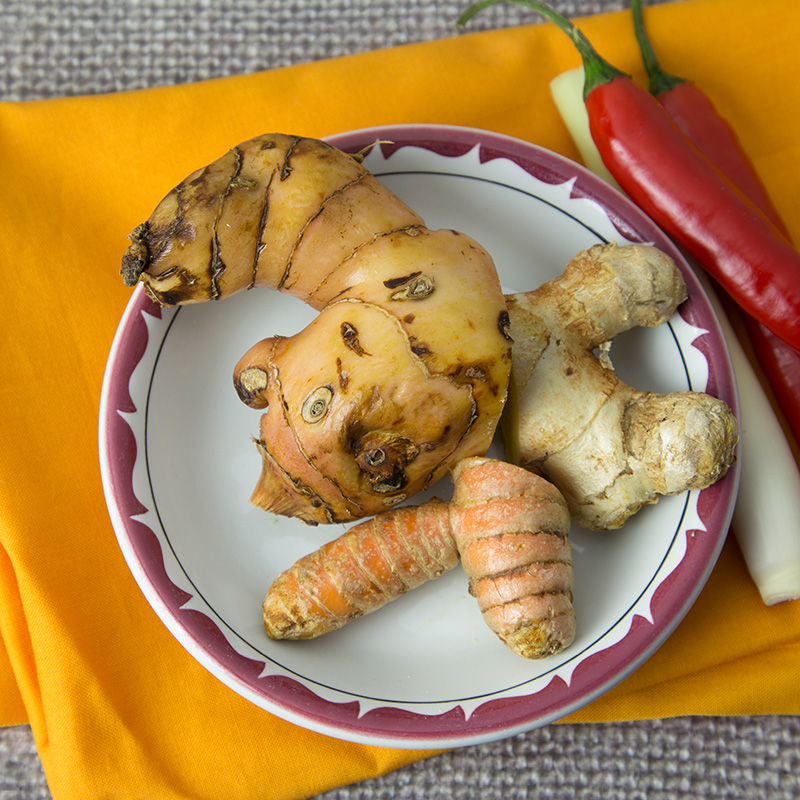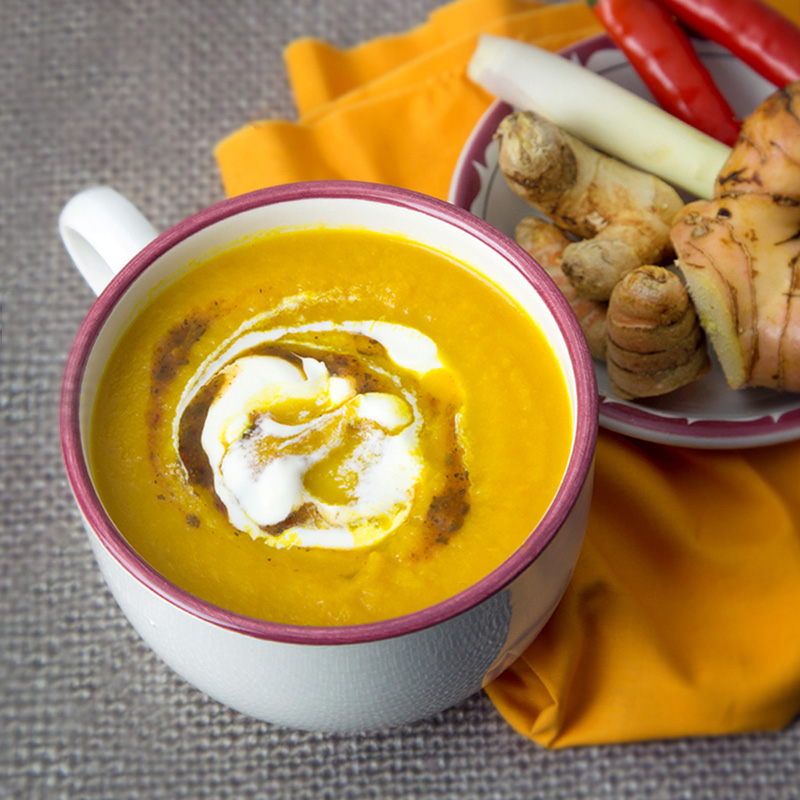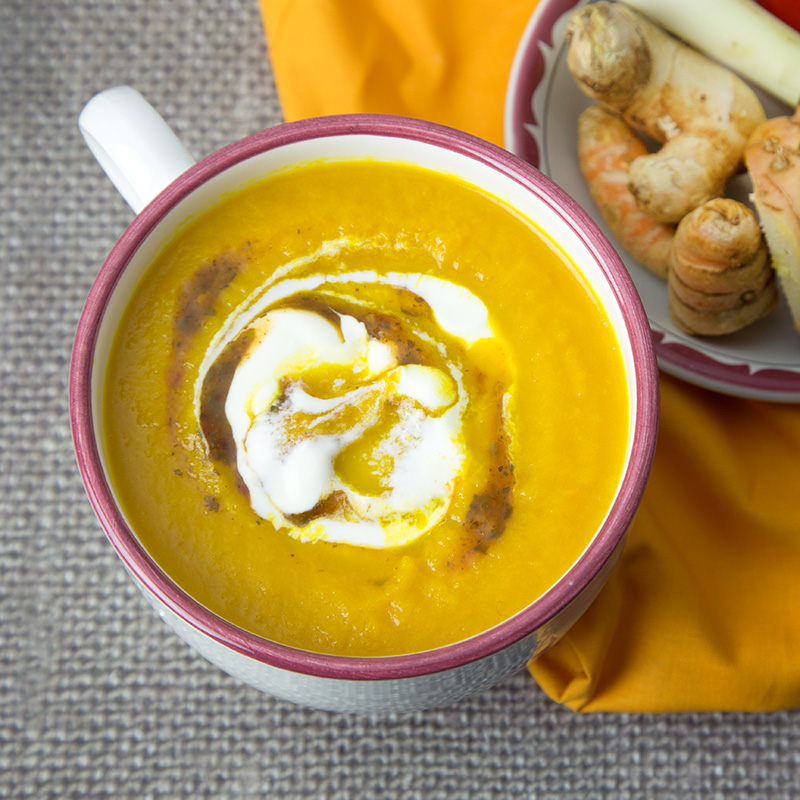Inflammation is an essential part of our innate immunity for infection control, where acutely it can be beneficial in helping us heal from trauma. We experience this kind of inflammation as PRISH – Pain, Redness, Immobility, Swelling and Heat. To illustrate, imagine having the flu accompanied by a sore throat. It may hurt to swallow (pain, immobility) and your tonsils may be red, enlarged and feel hot (redness, swelling, heat). Alternatively you may fall and take a blow to the knee – it becomes painful to walk on, swells up and appears reddened and warm to the touch. Luckily these conditions are temporary, with the effects of inflammation creating an environment where effective healing of damaged tissues can take place.
 Clockwise from top-left: Galangal, Ginger, Turmeric Rhizomes.
Clockwise from top-left: Galangal, Ginger, Turmeric Rhizomes.
Unfortunately, this isn’t the only type of inflammation experienced in the body, with more insidious, chronic inflammation contributing to many debilitating diseases. We are all susceptible to chronic inflammation, which may stem from prolonged stress, poor diet, food sensitivities, environmental toxin exposure or lifestyle choices such as smoking or excessive alcohol. Further, researchers now believe that chronic inflammation starts from the gut, where symptoms such as indigestion, constipation, diarrhoea or flatulence can be an early sign of gut-related inflammation. When it comes to foods with anti-inflammatory properties then, you can never have too many in your diet.

This soup uses some of my favourite anti-inflamatory foods, three herbs from the ginger (Zingiberaceae) plant family; ginger, turmeric and galangal. Pungent, spicy and flavourful; the volatile oils in these rhizomes are also loaded with antioxidants, promote circulation and aid digestion. Ginger and turmeric are also used in herbal medicine as ‘aromatics’. A flavour bomb for a healthy gut, I could honestly claim that every single ingredient in this carrot and three ginger soup is included to boost your protection against low-grade inflammation and enhance your digestive power.
Think I might be pulling your leg? Carrots contain beta-carotene that reduces oxidative damage and increases immune function. Lemongrass is anti-inflammatory, with analgesic and anti-fever actions. Onions and garlic contain several anti-inflammatory compounds, and are also healing for an inflamed, leaky gut. Chillis contain capsaicin which inhibits inflammatory processes and acts as an analgesic. Greek yoghurt contains beneficial probiotics that are anti-inflammatory and anti-pathogenic for the gut. Told you so 😉
 Further, if you make your stock from scratch, I implore you to use a bone broth where suitable. There’s a reason it’s a cornerstone of the GAPS diet – as it has an incredibly healing and protective action on the gut. If this is not an option, then make try making a vegie stock with lots of onions, carrots and celery for an anti-inflammatory boost.
Further, if you make your stock from scratch, I implore you to use a bone broth where suitable. There’s a reason it’s a cornerstone of the GAPS diet – as it has an incredibly healing and protective action on the gut. If this is not an option, then make try making a vegie stock with lots of onions, carrots and celery for an anti-inflammatory boost.
Finally, a note on hard-to-find ingredients – I am fortunate enough to have ginger, turmeric and galangal all available at my farmer’s market and local green grocer. Galangal has a more peppery, spicier taste than ginger but is similar in antioxidant and anti-inflammatory powers. Galangal is also woodier than either ginger or turmeric, taking more effort to peel and slice for cooking. Turmeric adds an earthy quality and is a much more potent antioxidant. While ginger and turmeric are now rather widespread in their availability in supermarkets, galangal may be harder to track down. I recommend checking local Asian grocers, or substituting with more ginger if unable to locate. This soup will be just as amazing and flavourful if you have to make do.

- 1 tbsp ghee or coconut oil (coconut oil for vegan soup)
- 1 medium brown onion, chopped
- 2 cloves garlic, minced
- 2cm piece fresh ginger, peeled and sliced
- 2cm piece fresh galangal, peeled and sliced
- 1cm fresh turmeric, peeled and sliced
- 1 long red chilli, diced
- 600g carrots, washed and roughly chopped
- 2 cups chicken or vegetable stock (vegetable for vegan soup)
- 2 cups water
- 2 5cm lengths of lemongrass stalks, outer sections removed and bruised slightly with a mallet
To serve - Greek yoghurt, cultured cashew yoghurt or coconut cream
- Hot chilli sauce
- Heat ghee or coconut oil in saucepan over medium-high heat. Add onion and saute for 5 minutes, or until softened. Add garlic, ginger, galangal, turmeric and chilli and cook for another 5 minutes, or until softened and aromatic.
- Add carrots and stock, then place lemongrass lengths into the soup. Bring mixture to a boil, and then lower heat to simmer for 15-20 minutes until carrots are softened. To test for doneness, prick carrot with a fork, if it slides off easily carrot is cooked.
- Remove lemongrass stalks and discard. Blend soup in batches in a high powered blender (such as the Optimum blender range) or process with an immersion blender until smooth. Serve with yoghurt, a drizzle of hot chilli sauce (such as Sriracha), or both.
1 comment